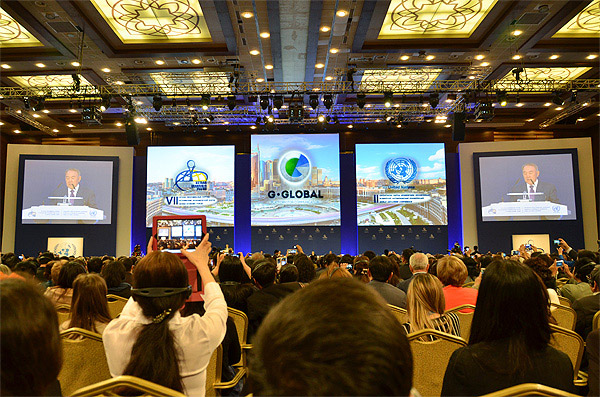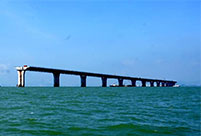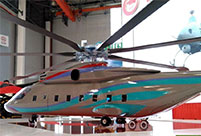


VII Astana Economic Forum (People's Daily Online/ Yao Chun)
ASTANA, May 24 (People’s Daily Online) -- Nowadays the world is becoming more interconnected. Global issues cannot be solved by an individual country. We need to work together to solve global economic issues, said politicians at the VII Astana Economic Forum on May 23.
The VII Astana Economic Forum enters the third day of discussions. How to deal with financial risks, poverty, and inequality has been highlighted in the conference. President of Kazakhstan Nursultan Nazarbayev, Prime Minister of Malaysia Najib Razak and ex-president of Bulgaria Petar Stoyanov shared their opinions on this issue.
After the financial crisis, world situation continues to keep countries in suspension
“Today we have to deal with new challenges in economy, finance, politics and social events. In terms of economy, European countries have not fully recovered after one of the deepest financial crisis. Unemployment increases dramatically. Political and social challenges are troubling us because of the failure to provide a global coordination, which makes it very difficult to successfully resolve global issues. At the same time we are witnessing very serious social conflicts in trouble spots and in countries which we consider as examples of social stability,” said Petar Stoyanov, ex-president of Bulgaria
“The world situation continues to keep countries in suspension. We must be prepared to different scenarios that world trend’s development. After the shock of the global financial and debt crisis the social tensions in the Eurozone are as serious as that in the Arabic countries. We are facing new challenges today. The recovery in developed countries may result in the reduction of investment in emerging countries by 50 percent or more,” said Nursultan Nazarbayev, president of Kazakhstan.
“Inequality keeps increasing. And the gap between the rich and the poor is widening, which increases social tension on the planet. International survey shows that the growing gap between the rich and the poor has become the most serious problem in the world. And this is not the problem of the poor countries, citizens of Europe-- Germany, Austria, Spain, France are exactly who make the gap. Many African and Asian countries are so called poverty trapped when poverty creates even more poverty. The very thinking that too poor to develop makes one believe that being poor is normal,” said Nazarbayev.
“The global economy is more interconnected than ever before. That offers great opportunity and great risks. Although significant progress has been made, there is much to do. To manage risk we must make sure that our reforms keep up with innovation in the financial sector. As Asian firms become greater share in global investment, they are more exposed to global risks. There will be new regulatory challenges such as the growth of shadow banking,” said Najib Razak, Prime Minister of Malaysia.
We need to work together to deal with new economic challenges
“Global challenges cannot be solved with individual groups. We need to work together. It’s absolutely necessary to revise the traditional principles and rules. We are living in a very interdependent and interconnected world. And the current financial crisis has clearly showed us our venerability. That’s why to resolve the sustainability issues we need to take efficient actions together,” said Petar Stoyanov.
“All of us should focus on the reduction of inequality and the eradication of poverty. The world can’t be harmonious and abundant when there are such serious problems in the world. To solve all these problems we need to move in two directions. Firstly maximize the use of economic development and avoid new significant economic shocks. Secondly, there is a need to develop a world map to eradicate poverty, providing large scale tools in developing human capital in the poorest countries of Africa and Asia,” said Nursultan Nazarbayev.
“Our awareness is not enough. What we really need is a commitment to resolve issues, quickly and together. International coordination is vital to reduce the impact of the risks on the global economy. Key economies must communicate their intentions early and effectively to prevent excessive market volatility. Those with high fiscal deficits and debuts need measures to adjust strategies. And developing economies must strengthen their fiscal, monetary and policy positions to enhance their resilience,” said Najib Razak.
“In this case I believe other economies can learn from Asia’s experience. After the world financial crisis in 1997 Asia made deep, structural and financial reforms in order to be resilient to external shocks. These reforms have left us with better fundamentals: more diversified financial markets and world capitalized financial institutions with more flexibility that can rebound better and more quickly from the global financial crisis. As Asia’s population and economy grow we must take a more prominent role in shaping the global financial architecture not only for our citizens but for the rest of the world,” said Najib Razak.
 World's passenger plane giants convene in Beijing aviation expo
World's passenger plane giants convene in Beijing aviation expo Art photos of Chinese beauty in Han Chinese clothing
Art photos of Chinese beauty in Han Chinese clothing Stunning photos of air show in China’s V-Day parade
Stunning photos of air show in China’s V-Day parade Construction of HK-Zhuhai-Macao Bridge enters final stage
Construction of HK-Zhuhai-Macao Bridge enters final stage Models change clothes on street in Hangzhou
Models change clothes on street in Hangzhou Model of heavy-lift copter makes debuts at Tianjin expo
Model of heavy-lift copter makes debuts at Tianjin expo Charming Chinese female soldiers
Charming Chinese female soldiers Beauty vs. muscular man
Beauty vs. muscular man First day in kindergarten
First day in kindergarten Up in the air
Up in the air Obama shouldn’t follow cyber spying hype
Obama shouldn’t follow cyber spying hype Halal hopes
Halal hopes Companies seek to hire PLA Honor Guard vets at job fair
Companies seek to hire PLA Honor Guard vets at job fairDay|Week